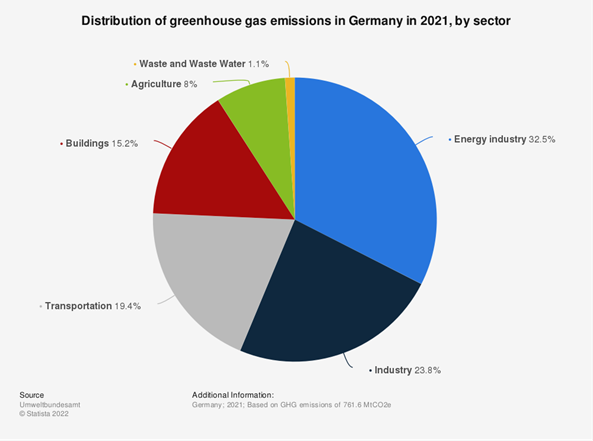Chapter 3
Sustainability is everywhere
This month’s Komoneed Collective Forces chapter 3 “Sustainability is everywhere” illustrates often overlooked sustainability areas including pet washes and building material.
Next month, Chapter 4 called “A package deal” will inform about reusable and compostable packaging options and outline the meaning of specific sustainability labels.
Now, let’s dive into some often-overlooked areas of sustainability!
The question of focus
When we advocate for more sustainability, which topics come to mind? Energy? Mobility? Fashion? Food? These industries are certainly extremely important when it comes to their sustainability impact, yet they should not be the only discussion points.
For example, looking at Germany’s greenhouse gas emissions in 2021 by sector, we can see that the energy industry did indeed account for 32.5 % of Germany’s total emissions that year. However, which other sectors are additional main contributors?
Next to industry and transportation, buildings were major causes of greenhouse gas emissions.
Yet, it seems that this sustainability area is rather neglected in discussions about changes that need to be made in order to reduce emissions and improve the sustainability impact.

Graph illustrating the distribution of Germany’s greenhouse gas emissions in 2021 by sector
Need for adequate living habitats
Additionally, it is estimated by UN-Habitat that 1.6 billion people live in “inadequate shelter” around the world. This can be due to various reasons: natural disasters, unfavorable climate conditions, corruption, among others. It is also estimated that by the end of the decade, 3 billion people will need to improve their living situations.
That indicates a huge potential demand – given the right materials and prices. In any case, as the prices of real estate continue to increase and become less accessible to vast parts of the population, cheaper options are extremely sought after. Combined with the growing awareness around sustainability and the impact that our living spaces have on the environment, more sustainability alternatives are definitely enticing.
Lego buildings
One innovative approach to solve this problem of inaccessibly and unsustainable buildings is 3D printing: 3D objects can be manufactured by adding successive layers of material, such as thermoplastics, metals, resins and ceramics.
3D printing housing material could enhance speed and reduce costs compared to traditional materials and buildings.
Also, due to a lower need for transport, less greenhouse gas emissions would be emitted. The 3D technology was recently used in India, in the city of Chennai, to build a 56m² home in 5 days. These houses are estimated to be 30% cheaper to manufacture and have generated less waste.
Would you consider living in a 3D printed house?
Another interesting solution could be using plastic bottles: In South Africa, a school was built with plastic bottles that allowed children to study in a better and cooler environment, as this option allows for more air circulation.
Eco-friendly pet washes
Having established the importance and innovation of buildings, let’s now move on to explore another interesting but rarely discussed sustainability topic: pet washes.
Over the past 10 years, the organic and 100% natural market has experienced a great boom. Consumers can buy more sustainable packaging (recycled, plant-based or even no packaging at all), and natural products are in fashion. Among them, natural soaps and shampoos play a major role: they are typically solid and made of natural ingredients.
But to take this trend one step further, we should also start caring about our pets’ health.

Commercialization of organic pet washes
WashBar is one example of a company focused on eco-friendly pet washes for dogs and horses – and its origin has a nice story: One day, Jules Smith was asked by one of her friends to create a soap for her dog with skin allergies.
When researching the topic and realizing how many sensitizing ingredients there were in most industrial products, she decided to take this project to a bigger level and created WashBar. With compostable and/or recycled packaging and all-organic ingredients, these pet washes serve a specific trend which is growing in traction.
While the focus is currently still on human skincare and high-quality ingredients, pet owners are increasingly looking out for ways to enhance their furry friends’ lives.
Much more to explore
Next to buildings and pet washes, there are of course numerous other highly fascinating and meaningful sustainability topics that need to be explored. When discussing industries, actions and possibilities, the aim should be to look at these elements as holistically as possible, meaning that we should strive to take all factors into consideration. We need to look at issues from multiple perspectives, think of potential consequences and solutions before attempting to actually solve them.
Similarly, it’s good to put more attention on neglected topics of sustainability, even if they may seem smaller or less relevant at first. Because ultimately, every area of life matters, just like each action matters, even if it’s just one small part or one singular person.
Your thoughts
What did you think about this month’s Komoneed Collective Forces chapter?
- Did you know about the importance of buildings for sustainability?
- Do you focus on sustainability impacts when buying your skincare? And if you own a pet, what about their products?
- What’s your opinion on the movement of organic and natural products?
- Which interesting projects have you heard of linked to 3D printing?
Sources
- https://www.trendhunter.com/protrends/printed-sustainability
- https://www.weforum.org/agenda/2021/05/countries-3d-printing-new-homes
- https://unhabitat.org/topic/housing
- https://www.habitat.org/our-work/terwilliger-center-innovation-in-shelter/shelter-venture-fund
- https://www.trendhunter.com/trends/washbar
- https://washbar.com
- https://www.statista.com/statistics/1044386/dog-and-cat-pet-population-worldwide/
- https://www.statista.com/statistics/989341/greenhouse-gas-emissions-by-sector-germany






while I think that organic & natural products are nice, I don’t really follow the hype around them. especially for my face which is sensitive, I prefer to use more fragrance-free formulas
It’s important that each of us find the balance between what is good for us and what’s good for the planet… It’s a difficult issue!
I think the focus on sustainability in Chapter 3 is crucial for our future.
I think focusing on sustainability is crucial for our future! What do you think?
I believe sustainability is just a trend. We should prioritize economic growth over environmental concerns. Our future depends on progress, not limitations. Lets not hold back innovation for the sake of a fleeting fad.
I disagree. Sustainability is a fundamental principle that should be integrated into all aspects of our lives. Its not just a trend, its a necessity for the future of our planet. We cant afford to ignore it.
I think the focus on sustainability is crucial for The Komoneed Collective Forces #3!
I respectfully disagree. While sustainability is important, lets not overlook the need for innovation and profitability. A well-rounded approach that balances economic, environmental, and social factors is key for The Komoneed Collective Forces #3 to truly make a lasting impact.